高级英语课文译文
高级英语课文翻译(上册)

课文翻译(Translation of the text)第一课超级摇滚巨星——关于我们自己和我们的社会,他们告诉我们些什么?摇滚乐是青少年反叛的音乐。
一—摇滚乐评论家约翰·罗克韦尔由其崇拜的人即可知其人。
——小说家罗伯特·佩恩·沃伦1972年6月中旬的一天,芝加哥圆形露天剧场里观众如潮,群情激昂,狂摇猛摆。
台上,滚石乐队的米克·贾格尔正在演唱“午夜漫步人”。
演唱结束时评论家唐·赫克曼在现场。
他说:“贾格尔抓起一个装有半加伦水的罐子沿着舞台前沿跑动,把里面的水往前几排狂热的听众身上洒。
他们蜂拥地跟随他,热切地希望能淋上几滴这洗礼的圣水。
”1973年12月下旬的一天,大约一万四千名尖声叫喊的歌迷在华盛顿市外的首都中心剧场嘈杂地涌向台前。
美国的恐怖歌星艾利斯·库珀正要结束自己表演。
他借助断头台假装结束自己生命来结束表演。
他的“头”落人一个草篮中。
“啊!”一个穿黑衣服的女孩惊呼道,“啊,太了不起了!”十四岁的迈克·玻利也在场,但他的父母并不在。
“他们觉得他令人恶心,”迈克说,“他们对我说,‘你怎么能忍受那种东西?’”1974年1月下旬的一天,在纽约州尤宁代尔的拿骚体育馆里,鲍勃·狄伦和乐队正在为音乐会上用的乐器调音。
场外瓢泼大雨中,摇滚乐迷克利斯·辛格正等着入场。
“这是朝圣,”克利斯说,“我应该跪着爬进去。
”你是如何看待所有这些溢美之词与英雄崇拜?当米克·贾格尔迷们把他视为至高的神父或神明时,你是赞成他们还是反对他们?你和克利斯·辛格一样对鲍勃·狄伦怀有几乎是宗教般的崇敬吗?你认为他或狄伦步入歧途了吗?你是否嫌艾利斯·库珀表演恶心而不接受他?还是你莫名其妙地被这个怪异的小丑吸引,因为他表现了你最疯狂的幻想?这并非是些随便问问的问题。
有些社会学家认为,你对这些问题的回答,很能说明你在想些什么,社会在想些什么。
高级英语1 第三版 课文翻译和单词

高级英语(第三版)第一册课文译文和词汇张汉熙版Lesson 1 Face to Face with Hurricane Camille迎战卡米尔号飓风约瑟夫.布兰克小约翰。
柯夏克已料到,卡米尔号飓风来势定然凶猛。
就在去年8月17日那个星期天,当卡米尔号飓风越过墨西哥湾向西北进袭之时,收音机和电视里整天不断地播放着飓风警报。
柯夏克一家居住的地方一-密西西比州的高尔夫港--肯定会遭到这场飓风的猛烈袭击。
路易斯安那、密西西比和亚拉巴马三州沿海一带的居民已有将近15万人逃往内陆安全地带。
但约翰就像沿海村落中其他成千上万的人一样,不愿舍弃家园,要他下决心弃家外逃,除非等到他的一家人一-妻子詹妮丝以及他们那七个年龄从三岁到十一岁的孩子一一眼看着就要灾祸临头。
为了找出应付这场风灾的最佳对策,他与父母商量过。
两位老人是早在一个月前就从加利福尼亚迁到这里来,住进柯夏克一家所住的那幢十个房间的屋子里。
他还就此征求过从拉斯韦加斯开车来访的老朋友查理?希尔的意见。
约翰的全部产业就在自己家里(他开办的玛格纳制造公司是设计、研制各种教育玩具和教育用品的。
公司的一切往来函件、设计图纸和工艺模具全都放在一楼)。
37岁的他对飓风的威力是深有体会的。
四年前,他原先拥有的位于高尔夫港以西几英里外的那个家就曾毁于贝翠号飓风(那场风灾前夕柯夏克已将全家搬到一家汽车旅馆过夜)。
不过,当时那幢房子所处的地势偏低,高出海平面仅几英尺。
"我们现在住的这幢房子高了23英尺,,'他对父亲说,"而且距离海边足有250码远。
这幢房子是1915年建造的。
至今还从未受到过飓风的袭击。
我们呆在这儿恐怕是再安全不过了。
"老柯夏克67岁.是个语粗心慈的熟练机械师。
他对儿子的意见表示赞同。
"我们是可以严加防卫。
度过难关的,"他说?"一但发现危险信号,我们还可以赶在天黑之前撤出去。
" 为了对付这场飓风,几个男子汉有条不紊地做起准备工作来。
大学高级英语教材原文翻译
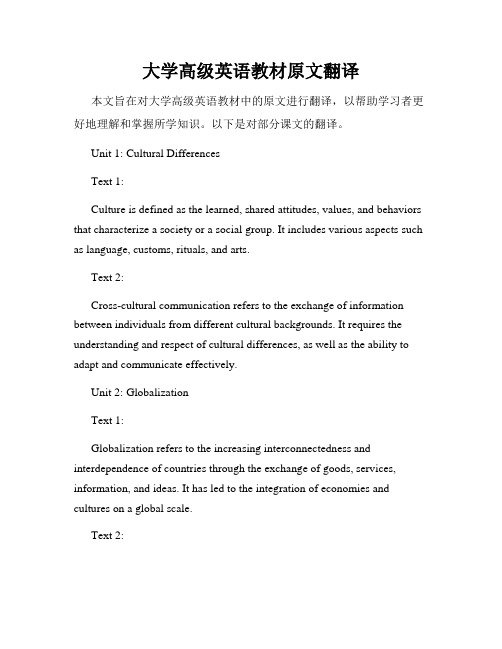
大学高级英语教材原文翻译本文旨在对大学高级英语教材中的原文进行翻译,以帮助学习者更好地理解和掌握所学知识。
以下是对部分课文的翻译。
Unit 1: Cultural DifferencesText 1:Culture is defined as the learned, shared attitudes, values, and behaviors that characterize a society or a social group. It includes various aspects such as language, customs, rituals, and arts.Text 2:Cross-cultural communication refers to the exchange of information between individuals from different cultural backgrounds. It requires the understanding and respect of cultural differences, as well as the ability to adapt and communicate effectively.Unit 2: GlobalizationText 1:Globalization refers to the increasing interconnectedness and interdependence of countries through the exchange of goods, services, information, and ideas. It has led to the integration of economies and cultures on a global scale.Text 2:The advantages of globalization include increased economic growth, improved standards of living, and access to a wider range of goods and services. However, it also brings challenges such as income inequality and cultural homogenization.Unit 3: Environmental IssuesText 1:Environmental issues are concerns that arise from the impact of human activities on the natural world. They include pollution, deforestation, climate change, and loss of biodiversity.Text 2:Sustainable development aims to meet the needs of the present generation without compromising the ability of future generations to meet their own needs. It involves the responsible use of resources and the protection of the environment.Unit 4: Technology and SocietyText 1:Technology plays a crucial role in shaping society and influencing various aspects of our lives. It has revolutionized communication, transportation, and the way we obtain and share information.Text 2:The ethical implications of technological advancements need to be carefully considered. Issues such as privacy, security, and the impact onemployment need to be addressed to ensure that technology benefits society as a whole.以上是部分大学高级英语教材中的课文翻译,希望能够对学习者加深理解和掌握有所帮助。
《高级英语》课文逐句翻译(6)
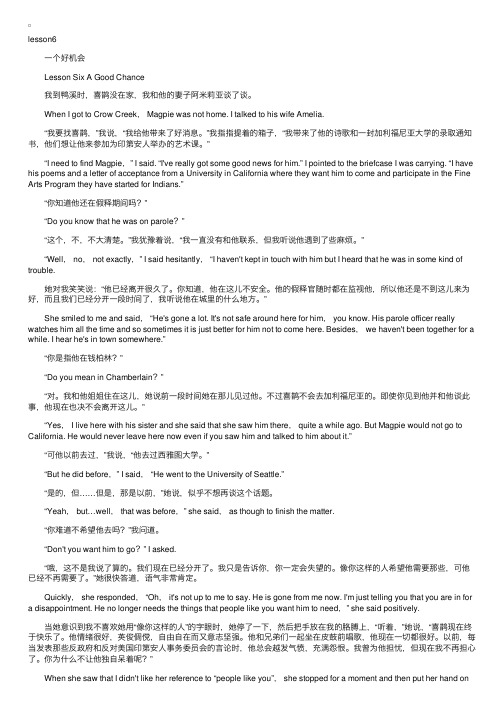
lesson6 ⼀个好机会 Lesson Six A Good Chance 我到鸭溪时,喜鹊没在家,我和他的妻⼦阿⽶莉亚谈了谈。
When I got to Crow Creek, Magpie was not home. I talked to his wife Amelia. “我要找喜鹊,”我说,“我给他带来了好消息。
”我指指提着的箱⼦,“我带来了他的诗歌和⼀封加利福尼亚⼤学的录取通知书,他们想让他来参加为印第安⼈举办的艺术课。
” “I need to find Magpie,” I said. “I've really got some good news for him.” I pointed to the briefcase I was carrying. “I have his poems and a letter of acceptance from a University in California where they want him to come and participate in the Fine Arts Program they have started for Indians.” “你知道他还在假释期间吗?” “Do you know that he was on parole?” “这个,不,不⼤清楚。
”我犹豫着说,“我⼀直没有和他联系,但我听说他遇到了些⿇烦。
” “Well, no, not exactly,” I said hesitantly, “I haven't kept in touch with him but I heard that he was in some kind of trouble. 她对我笑笑说:“他已经离开很久了。
你知道,他在这⼉不安全。
他的假释官随时都在监视他,所以他还是不到这⼉来为好,⽽且我们已经分开⼀段时间了,我听说他在城⾥的什么地⽅。
高级英语课文详解
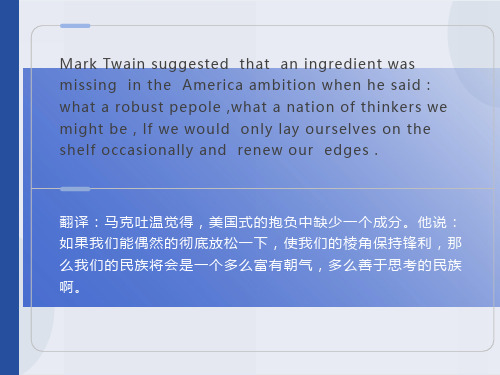
02
bathtub [bæθtʌb, bɑθ-] n. 浴缸,澡盆 eg: Please let the water out of the bathtub. 请把浴缸里的水放掉。 Bitterness fed on the man who had made the world laugh . The moralizing of his earlier writing had been well padded with humor . Now the gloves came off with biting satire . 译文:这个曾经给全世界带来欢笑的人自己却饱尝了人世间的不幸与辛酸。他早期作品中的说教包着幽默的外衣,可现在幽默却变成了辛辣的讽刺。
spinal [spaɪnəl] adj. 脊柱的,与脊柱有关的;针的,刺的;棘状突起的 adv. 在脊骨方面,压着脊骨 n. [医]脊髓麻醉 spinal injuries 脊椎损伤 meningitis [mɛnɪn`dʒaɪtɪs] n. 脑膜炎 Meningitis is a serious infectious illness which affects your brain and spinal cord. bronchitis 支气管炎 tonsillitis 扁桃体炎 appendicitis:阑尾炎 hepatitis 肝炎 arthritis 关节炎
高级英语下册的课文中英文翻译
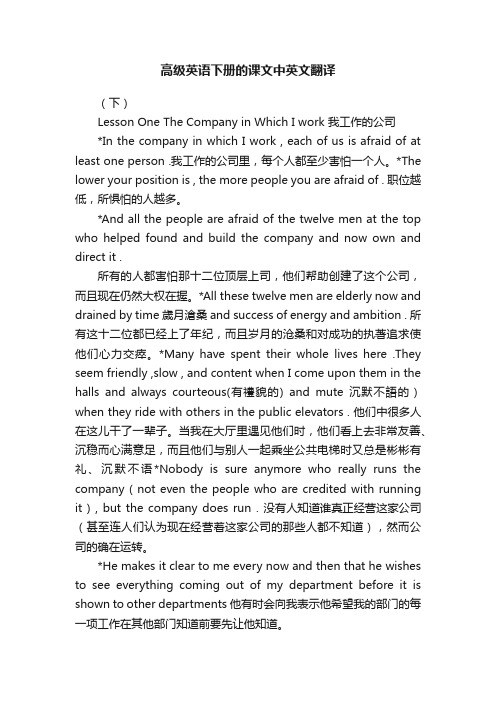
高级英语下册的课文中英文翻译(下)Lesson One The Company in Which I work 我工作的公司*In the company in which I work , each of us is afraid of at least one person .我工作的公司里,每个人都至少害怕一个人。
*The lower your position is , the more people you are afraid of . 职位越低,所惧怕的人越多。
*And all the people are afraid of the twelve men at the top who helped found and build the company and now own and direct it .所有的人都害怕那十二位顶层上司,他们帮助创建了这个公司,而且现在仍然大权在握。
*All these twelve men are elderly now and drained by time 歲月滄桑and success of energy and ambition . 所有这十二位都已经上了年纪,而且岁月的沧桑和对成功的执著追求使他们心力交瘁。
*Many have spent their whole lives here .They seem friendly ,slow , and content when I come upon them in the halls and always courteous(有禮貌的) and mute 沉默不語的)when they ride with others in the public elevators . 他们中很多人在这儿干了一辈子。
当我在大厅里遇见他们时,他们看上去非常友善、沉稳而心满意足,而且他们与别人一起乘坐公共电梯时又总是彬彬有礼、沉默不语*Nobody is sure anymore who really runs the company ( not even the people who are credited with running it ) , but the company does run . 没有人知道谁真正经营这家公司(甚至连人们认为现在经营着这家公司的那些人都不知道),然而公司的确在运转。
(完整word版)高英课文翻译
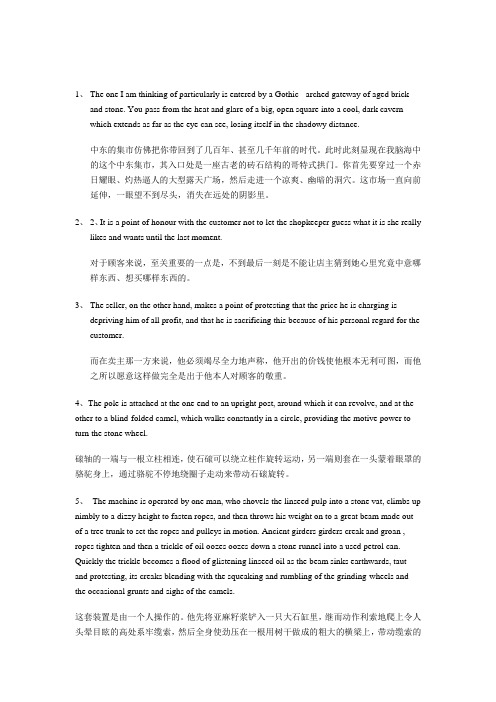
10、Each day that I escape death, each day of suffering that helps to free me fromearthlycares, I make a new little paper bird, and add it to the others. This way I look at them and congratulate myself of the good fortune that my illness has brought me. Because, thanks to it, I have the opportunity to improve my character."
对于顾客来说,至关重要的一点是,不到最后一刻是不能让店主猜到她心里究竟中意哪样东西、想买哪样东西的。
3、The seller, on the other hand, makes a point of protesting that the price he is charging isdepriving him ofall profit, and that he is sacrificing this because of his personal regard for the customer.
每当我从死神那儿挣脱出来的那一天,每当病痛将我从尘世烦恼中解放出来的那一天,我都要叠一只新的小纸鸟,加到原有的纸鸟群里去。我就这样看着这些纸鸟,庆幸病痛给自己带来的好运。因为正是我的病痛使我有了怡养性情的机会。”
11、In real life I am a large, big-boned woman with rough, man-working hands. In the winter I wear flannel nightgowns to bed and overalls during the day. I can kill and clean a hog as mercilessly as a man. My fat keeps me hot in zero weather. I can work outside all day, breaking ice to get water for washing; I can eat pork liver cooked over the open tire minutes after it comes steaming from the hog. One winter I knocked a bull calf straight in the brain between the eyes with a sledge hammer and had the meat hung up to chill be-fore nightfall. But of course all this does not show on television. I am the way my daughter would want me to be: a hundred pounds lighter, my skin like an uncooked barley pan-cake. My hair glistens in the hot bright lights. Johnny Car – son has much to do to keep up with my quick and witty tongue.
《高级英语》课文逐句翻译(10)
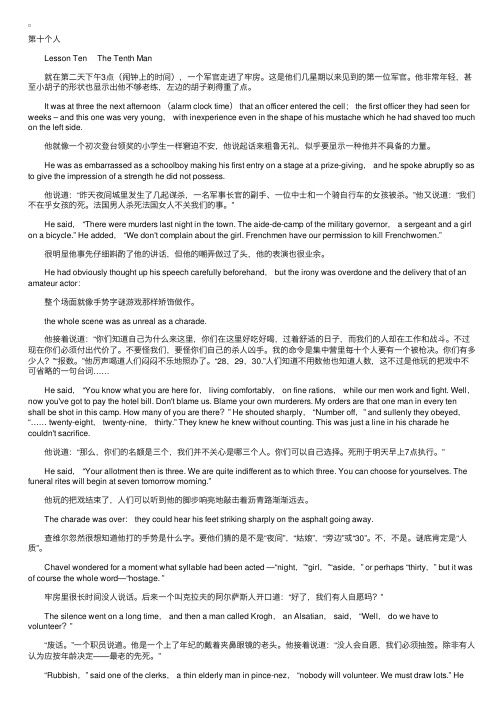
第⼗个⼈ Lesson Ten The Tenth Man 就在第⼆天下午3点(闹钟上的时间),⼀个军官⾛进了牢房。
这是他们⼏星期以来见到的第⼀位军官。
他⾮常年轻,甚⾄⼩胡⼦的形状也显⽰出他不够⽼练,左边的胡⼦剃得重了点。
It was at three the next afternoon (alarm clock time) that an officer entered the cell; the first officer they had seen for weeks – and this one was very young, with inexperience even in the shape of his mustache which he had shaved too much on the left side. 他就像⼀个初次登台领奖的⼩学⽣⼀样窘迫不安,他说起话来粗鲁⽆礼,似乎要显⽰⼀种他并不具备的⼒量。
He was as embarrassed as a schoolboy making his first entry on a stage at a prize-giving, and he spoke abruptly so as to give the impression of a strength he did not possess. 他说道:“昨天夜间城⾥发⽣了⼏起谋杀,⼀名军事长官的副⼿、⼀位中⼠和⼀个骑⾃⾏车的⼥孩被杀。
”他⼜说道:“我们不在乎⼥孩的死。
法国男⼈杀死法国⼥⼈不关我们的事。
” He said, “There were murders last night in the town. The aide-de-camp of the military governor, a sergeant and a girl on a bicycle.” He added, “We don't complain about the girl. Frenchmen have our permission to kill Frenchwomen.” 很明显他事先仔细斟酌了他的讲话,但他的嘲弄做过了头,他的表演也很业余。
《高级英语》课文逐句翻译(2)

青年⼈的四种选择 Lesson 2 Four Choices for Young People 在毕业前不久,斯坦福⼤学四年级主席吉姆?宾司给我写了⼀封信,信中谈及他的⼀些不安。
Shortly before his graduation, Jim Binns, president of the senior class at Stanford University, wrote me about some of his misgivings. 他写道:“与其他任何⼀代⼈相⽐,我们这⼀代⼈在看待成⼈世界时抱有更⼤的疑虑……同时越来越倾向于全盘否定成⼈世界。
” “More than any other generation,” he said, “our generation views the adult world with great skepticism… there is also an increased tendency to reject completely that world.” 很明显,他的话代表了许多同龄⼈的看法。
Apparently he speaks for a lot of his contemporaries. 在过去的⼏年⾥,我倾听过许多年轻⼈的谈话,他们有的还在⼤学读书,有的已经毕业,他们对于成⼈的世界同样感到不安。
During the last few years, I have listened to scores of young people, in college and out, who were just as nervous about the grown world. ⼤致来说,他们的态度可归纳如下:“这个世界乱糟糟的,到处充满了不平等、贫困和战争。
对此该负责的⼤概应是那些管理这个世界的成年⼈吧。
如果他们不能做得⽐这些更好,他们⼜能拿什么来教育我们呢?这样的教导,我们根本不需要。
高级英语第二册课文翻译

⾼级英语第⼆册课⽂翻译⾼级英语第⼆册课⽂翻译Unit1 Pub Talk and the King's English酒吧闲聊与标准英语亨利?费尔利⼈类的⼀切活动中,只有闲谈最宜于增进友谊,⽽且是⼈类特有的⼀种活动。
动物之间的信息交流,不论其⽅式何等复杂,也是称不上交谈的。
闲谈的引⼈⼈胜之处就在于它没有⼀个事先定好的话题。
它时⽽迂回流淌,时⽽奔腾起伏,时⽽⽕花四射,时⽽热情洋溢,话题最终会扯到什么地⽅去谁也拿不准。
要是有⼈觉得“有些话要说”,那定会⼤煞风景,使闲聊⽆趣。
闲聊不是为了进⾏争论。
闲聊中常常会有争论,不过其⽬的并不是为了说服对⽅。
闲聊之中是不存在什么输赢胜负的。
事实上,真正善于闲聊的⼈往往是随时准备让步的。
也许他们偶然间会觉得该把⾃⼰最得意的奇闻轶事选出⼀件插进来讲⼀讲,但⼀转眼⼤家已谈到别处去了,插话的机会随之⽽失,他们也就听之任之。
或许是由于我从⼩混迹于英国⼩酒馆的缘故吧,我觉得酒瞎⾥的闲聊别有韵味。
酒馆⾥的朋友对别⼈的⽣活毫⽆了解,他们只是临时凑到⼀起来的,彼此并⽆深交。
他们之中也许有⼈⾯临婚因破裂,或恋爱失败,或碰到别的什么不顺⼼的事⼉,但别⼈根本不管这些。
他们就像⼤仲马笔下的三个⽕枪⼿⼀样,虽然⽇⼣相处,却从不过问彼此的私事,也不去揣摸别⼈内⼼的秘密。
有⼀天晚上的情形正是这样。
⼈们正漫⽆边际地东扯西拉,从最普通的凡⼈俗事谈到有关⽊星的科学趣闻。
谈了半天也没有⼀个中⼼话题,事实上也不需要有⼀个中⼼话题。
可突然间⼤伙⼉的话题都集中到了⼀处,中⼼话题奇迹般地出现了。
我记不起她那句话是在什么情况下说出来的——她显然不是预先想好把那句话带到酒馆⾥来说的,那也不是什么⾮说不可的要紧话——我只知道她那句话是随着⼤伙⼉的话题⼗分⾃然地脱⼝⽽出的。
“⼏天前,我听到⼀个⼈说‘标准英语’这个词语是带贬义的批评⽤语,指的是⼈们应该尽量避免使⽤的英语。
”此语⼀出,谈话⽴即热烈起来。
有⼈赞成,也有⼈怒斥,还有⼈则不以为然。
高级英语第一册课文翻译_unit1
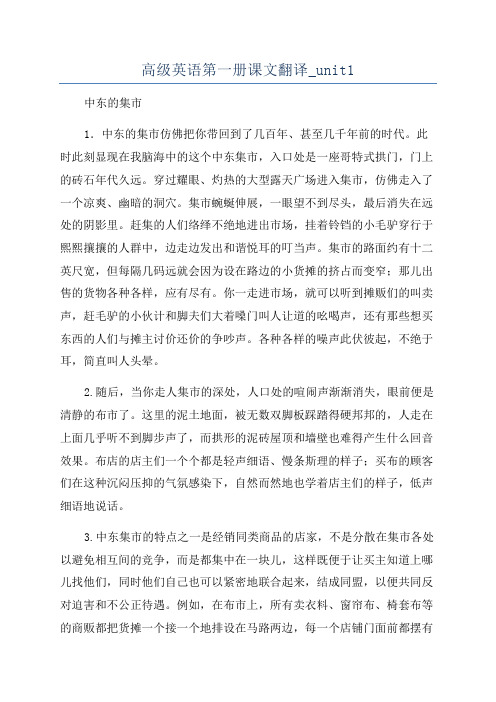
高级英语第一册课文翻译_unit1中东的集市1.中东的集市仿佛把你带回到了几百年、甚至几千年前的时代。
此时此刻显现在我脑海中的这个中东集市,入口处是一座哥特式拱门,门上的砖石年代久远。
穿过耀眼、灼热的大型露天广场进入集市,仿佛走入了一个凉爽、幽暗的洞穴。
集市蜿蜒伸展,一眼望不到尽头,最后消失在远处的阴影里。
赶集的人们络绎不绝地进出市场,挂着铃铛的小毛驴穿行于熙熙攘攘的人群中,边走边发出和谐悦耳的叮当声。
集市的路面约有十二英尺宽,但每隔几码远就会因为设在路边的小货摊的挤占而变窄;那儿出售的货物各种各样,应有尽有。
你一走进市场,就可以听到摊贩们的叫卖声,赶毛驴的小伙计和脚夫们大着嗓门叫人让道的吆喝声,还有那些想买东西的人们与摊主讨价还价的争吵声。
各种各样的噪声此伏彼起,不绝于耳,简直叫人头晕。
2.随后,当你走人集市的深处,人口处的喧闹声渐渐消失,眼前便是清静的布市了。
这里的泥土地面,被无数双脚板踩踏得硬邦邦的,人走在上面几乎听不到脚步声了,而拱形的泥砖屋顶和墙壁也难得产生什么回音效果。
布店的店主们一个个都是轻声细语、慢条斯理的样子;买布的顾客们在这种沉闷压抑的气氛感染下,自然而然地也学着店主们的样子,低声细语地说话。
3.中东集市的特点之一是经销同类商品的店家,不是分散在集市各处以避免相互间的竞争,而是都集中在一块儿,这样既便于让买主知道上哪儿找他们,同时他们自己也可以紧密地联合起来,结成同盟,以便共同反对迫害和不公正待遇。
例如,在布市上,所有卖衣料、窗帘布、椅套布等的商贩都把货摊一个接一个地排设在马路两边,每一个店铺门面前都摆有一张陈列商品的搁板桌和一些存放货物的货架。
讨价还价是人们习以为常的事。
头戴面纱的妇女们迈着悠闲的步子从一个店铺逛到另一个店铺,一边挑选一边问价;在她们缩小选择范围并开始正儿八经杀价之前,往往总要先同店主谈论几句,探探价底。
4.对于顾客来说,不到最后一刻绝不能让店主猜到她心里究竟中意哪样东西、想买哪样东西,因为这是个关乎面子的事情。
高级英语一课文翻译
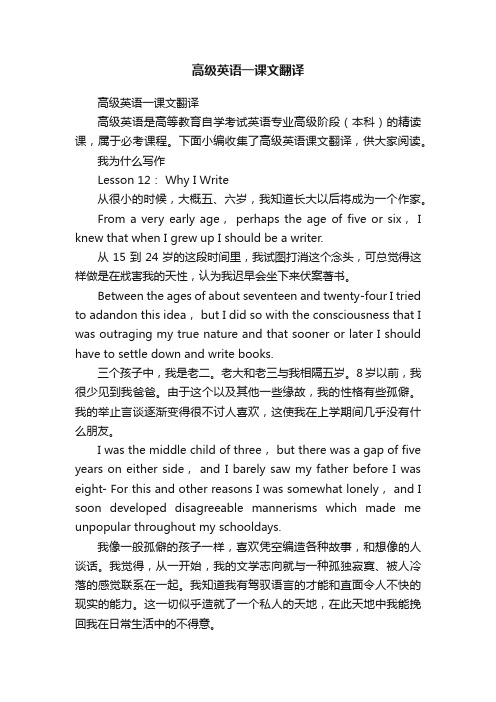
高级英语一课文翻译高级英语一课文翻译高级英语是高等教育自学考试英语专业高级阶段(本科)的精读课,属于必考课程。
下面小编收集了高级英语课文翻译,供大家阅读。
我为什么写作Lesson 12: Why I Write从很小的时候,大概五、六岁,我知道长大以后将成为一个作家。
From a very early age,perhaps the age of five or six,I knew that when I grew up I should be a writer.从15到24岁的这段时间里,我试图打消这个念头,可总觉得这样做是在戕害我的天性,认为我迟早会坐下来伏案著书。
Between the ages of about seventeen and twenty-four I tried to adandon this idea, but I did so with the consciousness that I was outraging my true nature and that sooner or later I should have to settle down and write books.三个孩子中,我是老二。
老大和老三与我相隔五岁。
8岁以前,我很少见到我爸爸。
由于这个以及其他一些缘故,我的性格有些孤僻。
我的举止言谈逐渐变得很不讨人喜欢,这使我在上学期间几乎没有什么朋友。
I was the middle child of three, but there was a gap of five years on either side, and I barely saw my father before I was eight- For this and other reasons I was somewhat lonely, and I soon developed disagreeable mannerisms which made me unpopular throughout my schooldays.我像一般孤僻的孩子一样,喜欢凭空编造各种故事,和想像的人谈话。
高级英语课文翻译
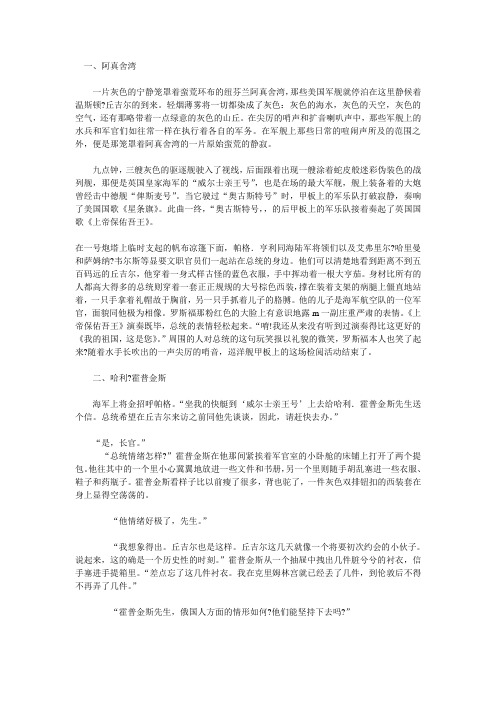
一、阿真舍湾一片灰色的宁静笼罩着蛮荒环布的纽芬兰阿真舍湾,那些美国军舰就停泊在这里静候着温斯顿?丘吉尔的到来。
轻烟薄雾将一切都染成了灰色:灰色的海水,灰色的天空,灰色的空气,还有那略带着一点绿意的灰色的山丘。
在尖厉的哨声和扩音喇叭声中,那些军舰上的水兵和军官们如往常一样在执行着各自的军务。
在军舰上那些日常的喧闹声所及的范围之外,便是那笼罩着阿真舍湾的一片原始蛮荒的静寂。
九点钟,三艘灰色的驱逐舰驶入了视线,后面跟着出现一艘涂着蛇皮般迷彩伪装色的战列舰,那便是英国皇家海军的“威尔士亲王号”,也是在场的最大军舰,舰上装备着的大炮曾经击中德舰“俾斯麦号”。
当它驶过“奥古斯特号”时,甲板上的军乐队打破寂静,奏响了美国国歌《星条旗》。
此曲一终,“奥古斯特号,,的后甲板上的军乐队接着奏起了英国国歌《上帝保佑吾王》。
在一号炮塔上临时支起的帆布凉篷下面,帕格.亨利同海陆军将领们以及艾弗里尔?哈里曼和萨姆纳?韦尔斯等显要文职官员们一起站在总统的身边。
他们可以清楚地看到距离不到五百码远的丘吉尔,他穿着一身式样古怪的蓝色衣服,手中挥动着一根大亨茄。
身材比所有的人都高大得多的总统则穿着一套正正规规的大号棕色西装,撑在装着支架的病腿上僵直地站着,一只手拿着礼帽故于胸前,另一只手抓着儿子的胳膊。
他的儿子是海军航空队的一位军官,面貌同他极为相像。
罗斯福那粉红色的大脸上有意识地露m一副庄重严肃的表情。
《上帝保佑吾王》演奏既毕,总统的表情轻松起来。
“唷!我还从来没有听到过演奏得比这更好的《我的祖国,这是您》。
”周围的人对总统的这句玩笑报以礼貌的微笑,罗斯福本人也笑了起来?随着水手长吹出的一声尖厉的哨音,巡洋舰甲板上的这场检阅活动结束了。
二、哈利?霍普金斯海军上将金招呼帕格。
“坐我的快艇到‘威尔士亲王号’上去给哈利.霍普金斯先生送个信。
总统希望在丘吉尔来访之前同他先谈谈,因此,请赶快去办。
”“是,长官。
”“总统情绪怎样?”霍普金斯在他那间紧挨着军官室的小卧舱的床铺上打开了两个提包。
00600高级英语课文翻译(全中文)
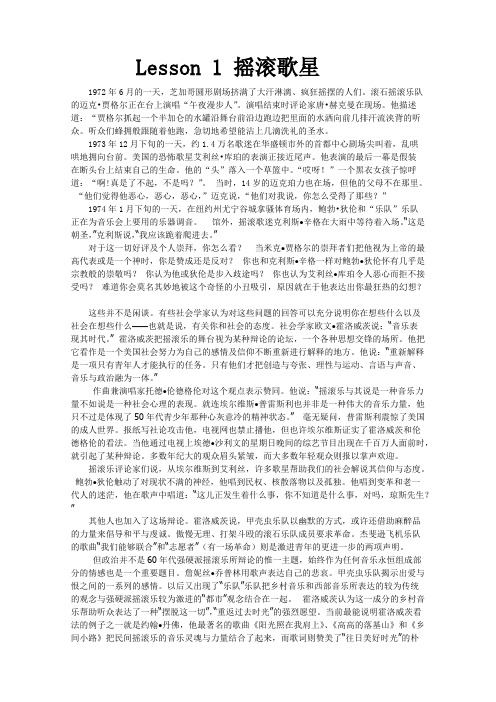
Lesson 1 摇滚歌星1972年6月的一天,芝加哥圆形剧场挤满了大汗淋漓、疯狂摇摆的人们。
滚石摇滚乐队的迈克•贾格尔正在台上演唱“午夜漫步人”。
演唱结束时评论家唐•赫克曼在现场。
他描述道:“贾格尔抓起一个半加仑的水罐沿舞台前沿边跑边把里面的水洒向前几排汗流浃背的听众。
听众们蜂拥般跟随着他跑,急切地希望能沾上几滴洗礼的圣水。
1973年12月下旬的一天,约1.4万名歌迷在华盛顿市外的首都中心剧场尖叫着,乱哄哄地拥向台前。
美国的恐怖歌星艾利丝•库珀的表演正接近尾声。
他表演的最后一幕是假装在断头台上结束自己的生命。
他的“头”落入一个草篮中。
“哎呀!”一个黑衣女孩子惊呼道:“啊!真是了不起,不是吗?”。
当时,14岁的迈克珀力也在场,但他的父母不在那里。
“他们觉得他恶心,恶心,恶心,”迈克说,“他们对我说,你怎么受得了那些?”1974年1月下旬的一天,在纽约州尤宁谷城拿骚体育场内,鲍勃•狄伦和“乐队”乐队正在为音乐会上要用的乐器调音。
馆外,摇滚歌迷克利斯•辛格在大雨中等待着入场。
“这是朝圣,”克利斯说,“我应该跪着爬进去。
”对于这一切好评及个人崇拜,你怎么看?当米克•贾格尔的崇拜者们把他视为上帝的最高代表或是一个神时,你是赞成还是反对?你也和克利斯•辛格一样对鲍勃•狄伦怀有几乎是宗教般的崇敬吗?你认为他或狄伦是步入歧途吗?你也认为艾利丝•库珀令人恶心而拒不接受吗?难道你会莫名其妙地被这个奇怪的小丑吸引,原因就在于他表达出你最狂热的幻想?这些并不是闲谈。
有些社会学家认为对这些问题的回答可以充分说明你在想些什么以及社会在想些什么——也就是说,有关你和社会的态度。
社会学家欧文•霍洛威茨说:“音乐表现其时代。
” 霍洛威茨把摇滚乐的舞台视为某种辩论的论坛,一个各种思想交锋的场所。
他把它看作是一个美国社会努力为自己的感情及信仰不断重新进行解释的地方。
他说:“重新解释是一项只有青年人才能执行的任务。
只有他们才把创造与夸张、理性与运动、言语与声音、音乐与政治融为一体。
高级英语课文翻译

高级英语课文翻译课文翻译Once again, outside in the open air, I tore into little pieces a small notebook with questions that I'd prepared in advance for inter views with the patients of the atomic ward. Among them was the que stion: Do you really think that Hiroshima is the liveliest city in Japan? I never asked it. But I could read the answer in every eye.从医院出来,我又一次地撕碎了一个小笔记本,那上面记着我预先想好准备在采访原子病区的病人时提问的一些问题,其中有一个问题就是:你是否真的认为广岛是日本最充满活力的城市?我一直没问这问题,但我已能从每个人的眼神中体会出这个问题的答案。
Most Americans remember Mark Twain as the father of Huck Finn's idyllic cruise through eternal boyhood and Tom Sawyer's endless summer of freedom and adventure. In-deed, this nation's best-loved author was every bit as ad-venturous, patriotic, romantic, and humorous as anyone has ever i magined. I found another Twain as well – one who grew cynical, bitter, saddened by the profound personal tragedies life dealt him, a man who became obsessed with the frailties of the human race, who saw clearly ahead a black wall of night.在大多数美国人的心目中,马克?吐温是位伟大作家,他描写了哈克?费恩永恒的童年时代中充满诗情画意的旅程和汤姆?索亚在漫长的夏日里自由自在历险探奇的故事。
高级英语原文及翻译
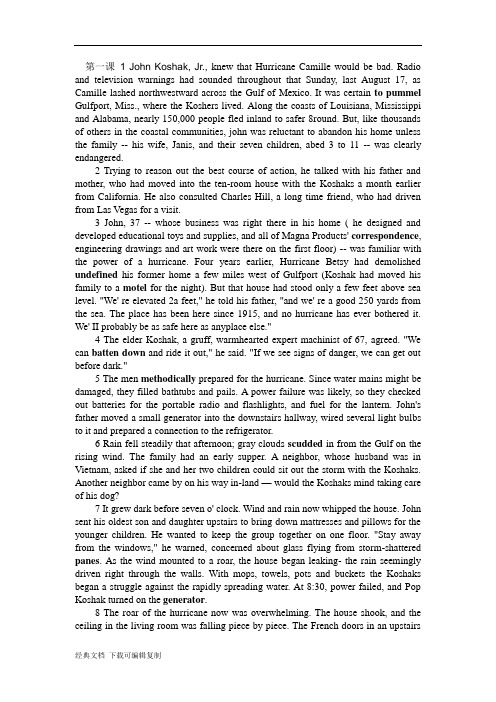
第一课 1 John Koshak, Jr.,knew that Hurricane Camille would be bad. Radio and television warnings had sounded throughout that Sunday, last August 17, as Camille lashed northwestward across the Gulf of Mexico. It was certain to pummel Gulfport, Miss., where the Koshers lived. Along the coasts of Louisiana, Mississippi and Alabama, nearly 150,000 people fled inland to safer 8round. But, like thousands of others in the coastal communities, john was reluctant to abandon his home unless the family -- his wife, Janis, and their seven children, abed 3 to 11 -- was clearly endangered.2 Trying to reason out the best course of action, he talked with his father and mother, who had moved into the ten-room house with the Koshaks a month earlier from California. He also consulted Charles Hill, a long time friend, who had driven from Las Vegas for a visit.3 John, 37 -- whose business was right there in his home ( he designed and developed educational toys and supplies, and all of Magna Products' correspondence, engineering drawings and art work were there on the first floor) -- was familiar with the power of a hurricane. Four years earlier, Hurricane Betsy had demolished undefined his former home a few miles west of Gulfport (Koshak had moved his family to a motel for the night). But that house had stood only a few feet above sea level. "We' re elevated 2a feet," he told his father, "and we' re a good 250 yards from the sea. The place has been here since 1915, and no hurricane has ever bothered it. We' II probably be as safe here as anyplace else."4 The elder Koshak, a gruff, warmhearted expert machinist of 67, agreed. "We can batten down and ride it out," he said. "If we see signs of danger, we can get out before dark."5 The men methodically prepared for the hurricane. Since water mains might be damaged, they filled bathtubs and pails. A power failure was likely, so they checked out batteries for the portable radio and flashlights, and fuel for the lantern. John's father moved a small generator into the downstairs hallway, wired several light bulbs to it and prepared a connection to the refrigerator.6 Rain fell steadily that afternoon; gray clouds scudded in from the Gulf on the rising wind. The family had an early supper. A neighbor, whose husband was in Vietnam, asked if she and her two children could sit out the storm with the Koshaks. Another neighbor came by on his way in-land — would the Koshaks mind taking care of his dog?7 It grew dark before seven o' clock. Wind and rain now whipped the house. John sent his oldest son and daughter upstairs to bring down mattresses and pillows for the younger children. He wanted to keep the group together on one floor. "Stay away from the windows," he warned, concerned about glass flying from storm-shattered panes. As the wind mounted to a roar, the house began leaking- the rain seemingly driven right through the walls. With mops, towels, pots and buckets the Koshaks began a struggle against the rapidly spreading water. At 8:30, power failed, and Pop Koshak turned on the generator.8 The roar of the hurricane now was overwhelming. The house shook, and the ceiling in the living room was falling piece by piece. The French doors in an upstairsroom blew in with an explosive sound, and the group heard gun- like reports as other upstairs windows disintegrated. Water rose above their ankles.9 Then the front door started to break away from its frame. John and Charlie put their shoulders against it, but a blast of water hit the house, flinging open the door and shoving them down the hall. The generator was doused, and the lights went out. Charlie licked his lips and shouted to John. "I think we' re in real trouble. That water tasted salty." The sea had reached the house, and the water was rising by the minute!10 "Everybody out the back door to the oars!" John yelled. "We' II pass the children along between us. Count them! Nine!"11 The children went from adult to adult like buckets in a fire brigade. But the cars wouldn't start; the electrical systems had been killed by water. The wind was too Strong and the water too deep to flee on foot. "Back to the house!" john yelled. "Count the children! Count nine!"12 As they scrambled back, john ordered, "Every-body on the stairs!" Frightened, breathless and wet, the group settled on the stairs, which were protected by two interior walls. The children put the oat, Spooky, and a box with her four kittens on the landing. She peered nervously at her litter. The neighbor's dog curled up and went to sleep.13 The wind sounded like the roar of a train passing a few yards away. The house shuddered and shifted on its foundations. Water inched its way up the steps as first- floor outside walls collapsed. No one spoke. Everyone knew there was no escape; they would live or die in the house.14 Charlie Hill had more or less taken responsibility for the neighbor and her two children. The mother was on the verge of panic. She clutched his arm and kept repeating, "I can't swim, I can't swim."15 "You won't have to," he told her, with outward calm. "It's bound to end soon."16 Grandmother Koshak reached an arm around her husband's shoulder and put her mouth close to his ear. "Pop," she said, "I love you." He turned his head and answered, "I love you" -- and his voice lacked its usual gruffness.17 John watched the water lap at the steps, and felt a crushing guilt. He had underestimated the ferocity of Camille. He had assumed that what had never happened could not happen. He held his head between his hands, and silently prayed: "Get us through this mess, will You?"18 A moment later, the hurricane, in one mighty swipe, lifted the entire roof off the house and skimmed it 40 feet through the air. The bottom steps of the staircase broke apart. One wall began crumbling on the marooned group.19 Dr. Robert H. Simpson, director of the National Hurricane Center in Miami, Fla., graded Hurricane Camille as "the greatest recorded storm ever to hit a populated area in the Western Hemisphere." in its concentrated breadth of some 70 miles it shot out winds of nearly 200 m.p.h. and raised tides as high as 30 feet. Along the Gulf Coast it devastated everything in its swath: 19,467 homes and 709 small businesses were demolished or severely damaged. it seized a 600, 000-gallon Gulfport oil tank and dumped it 3 ~ miles away. It tore three large cargo ships from their moorings and beached them. Telephone poles and 20-inch-thick pines cracked like guns as thewinds snapped them.20 To the west of Gulfport, the town of Pass Christian was virtually wiped out. Several vacationers at the luxurious Richelieu Apartments there held a hurricane party to watch the storm from their spectacular vantage point. Richelieu Apartments were smashed apart as if by a gigantic fist, and 26 people perished.21 Seconds after the roof blew off the Koshak house, john yelled, "Up the stairs -- into our bedroom! Count the kids." The children huddled in the slashing rain within the circle of adults. Grandmother Koshak implored, "Children, let's sing!" The children were too frightened to respond. She carried on alone for a few bars; then her voice trailed away.22 Debris flew as the living-room fireplace and its chimney collapsed. With two walls in their bedroom sanctuary beginning to disintegrate, John ordered, "Into the television room!" This was the room farthest from the direction of the storm.23 For an instant, John put his arm around his wife. Janis understood. Shivering from the wind and rain and fear, clutching two children to her, she thought, Dear Lord, give me the strength to endure what I have to. She felt anger against the hurricane. We won't let it win.24 Pop Koshak raged silently, frustrated at not being able to do anything to fight Camille. Without reason, he dragged a cedar chest and a double mattress from a bed-room into the TV room. At that moment, the wind tore out one wall and extinguished the lantern. A second wall moved, wavered, Charlie Hill tried to support it, but it toppled on him, injuring his back. The house, shuddering and rocking, had moved 25 feet from its foundations. The world seemed to be breaking apart.25 "Let's get that mattress up!" John shouted to his father. "Make it a lean-to against the wind. Get the kids under it. We can prop it up with our heads and shoulders!"26 The larger children sprawled on the floor, with the smaller ones in a layer on top of them, and the adults bent over all nine. The floor tilted. The box containing the litter of kittens slid off a shelf and vanished in the wind. Spooky flew off the top of a sliding bookcase and also disappeared. The dog cowered with eyes closed. A third wall gave way. Water lapped across the slanting floor. John grabbed a door which was still hinged to one closet wall. "If the floor goes," he yelled at his father, "let's get the kids on this."27 In that moment, the wind slightly diminished, and the water stopped rising. Then the water began receding. The main thrust of Camille had passed. The Koshaks and their friends had survived.28 With the dawn, Gulfport people started coming back to their homes. They saw human bodies -- more than 130 men, women and children died along the Mississippi coast- and parts of the beach and highway were strewn with dead dogs, cats, cattle. Strips of clothing festooned the standing trees, and blown down power lines coiled like black spaghetti over the roads.29 None of the returnees moved quickly or spoke loudly; they stood shocked, trying to absorb the shattering scenes before their eyes. "What do we dot" they asked. "Where do we go?"30 By this time, organizations within the area and, in effect, the entire population of the United States had come to the aid of the devastated coast. Before dawn, the Mississippi National Guard and civil-defense units were moving in to handle traffic, guard property, set up communications centers, help clear the debris and take the homeless by truck and bus to refugee centers. By 10 a.m., the Salvation Army's canteen trucks and Red Cross volunteers and staffers were going wherever possible to distribute hot drinks, food, clothing and bedding.31 From hundreds of towns and cities across the country came several million dollars in donations; household and medical supplies streamed in by plane, train, truck and car. The federal government shipped 4,400,000 pounds of food, moved in mobile homes, set up portable classrooms, opened offices to provide low-interest, long-term business loans.32 Camille, meanwhile, had raked its way northward across Mississippi, dropping more than 28 inches of rain into West Virginia and southern Virginia, causing rampaging floods, huge mountain slides and 111 additional deaths before breaking up over the Atlantic Ocean.33 Like many other Gulfport families, the Koshaks quickly began reorganizing their lives, John divided his family in the homes of two friends. The neighbor with her two children went to a refugee center. Charlie Hill found a room for rent. By Tuesday, Charlie's back had improved, and he pitched in with Seabees in the worst volunteer work of all--searching for bodies. Three days after the storm, he decided not to return to Las Vegas, but to "remain in Gulfport and help rebuild the community."34 Near the end of the first week, a friend offered the Koshaks his apartment, and the family was reunited. The children appeared to suffer no psychological damage from their experience; they were still awed by the incomprehensible power of the hurricane, but enjoyed describing what they had seen and heard on that frightful night, Janis had just one delayed reaction. A few nights after the hurricane, she awoke suddenly at 2 a.m. She quietly got up and went outside. Looking up at the sky and, without knowing she was going to do it, she began to cry softly.35 Meanwhile, John, Pop and Charlie were picking through the wreckage of the home. It could have been depressing, but it wasn't: each salvaged item represented a little victory over the wrath of the storm. The dog and cat suddenly appeared at the scene, alive and hungry.36 But the blues did occasionally afflict all the adults. Once, in a low mood, John said to his parents, "I wanted you here so that we would all be together, so you could enjoy the children, and look what happened."37 His father, who had made up his mind to start a welding shop when living was normal again, said, "Let's not cry about what's gone. We' II just start all over."38 "You're great," John said. "And this town has a lot of great people in it. It' s going to be better here than it ever was before."39 Later, Grandmother Koshak reflected: "We lost practically all our possessions, but the family came through it. When I think of that, I realize we lost nothing important."第二课1 As the corpse went past the flies left the restaurant table in a cloud and rushed after it, but they came back a few minutes later.2 The little crowd of mourners -- all men and boys, no women--threaded their way across the market place between the piles of pomegranates and the taxis and the camels, walling a short chant over and over again. What really appeals to the flies is that the corpses here are never put into coffins, they are merely wrapped in a piece of rag and carried on a rough wooden bier on the shoulders of four friends. When the friends get to the burying-ground they hack an oblong hole a foot or two deep, dump the body in it and fling over it a little of the dried-up, lumpy earth, which is like broken brick. No gravestone, no name, no identifying mark of any kind. The burying-ground is merely a huge waste of hummocky earth, like a derelict building-lot. After a month or two no one can even be certain where his own relatives are buried.3 When you walk through a town like this -- two hundred thousand inhabitants of whom at least twenty thousand own literally nothing except the rags they stand up in-- when you see how the people live, and still more how easily they die, it is always difficult to believe that you are walking among human beings. All colonial empires are in reality founded upon this fact. The people have brown faces--besides, there are so many of them! Are they really the same flesh as your self? Do they even have names? Or are they merely a kind of undifferentiated brown stuff, about as individual as bees or coral insects? They rise out of the earth,they sweat and starve for a few years, and then they sink back into the nameless mounds of the graveyard and nobody notices that they are gone. And even the graves themselves soon fade back into the soil. Sometimes, out for a walk as you break your way through the prickly pear, you notice that it is rather bumpy underfoot, and only a certain regularity in the bumps tells you that you are walking over skeletons.4 I was feeding one of the gazelles in the public gardens.5 Gazelles are almost the only animals that look good to eat when they are still alive, in fact, one can hardly look at their hindquarters without thinking of a mint sauce. The gazelle I was feeding seemed to know that this thought was in my mind, for though it took the piece of bread I was holding out it obviously did not like me. It nibbled nibbled rapidly at the bread, then lowered its head and tried to butt me, then took another nibble and then butted again. Probably its idea was that if it could drive me away the bread would somehow remain hanging in mid-air.6 An Arab navvy working on the path nearby lowered his heavy hoe and sidled slowly towards us. He looked from the gazelle to the bread and from the bread to the gazelle, with a sort of quiet amazement, as though he had never seen anything quite like this before. Finally he said shyly in French: "1 could eat some of that bread."7 I tore off a piece and he stowed it gratefully in some secret place under his rags. This man is an employee of the municipality.8 When you go through the Jewish Quarters you gather some idea of what the medieval ghettoes were probably like. Under their Moorish Moorishrulers the Jewswere only allowed to own land in certain restricted areas, and after centuries of this kind of treatment they have ceased to bother about overcrowding. Many of the streets are a good deal less than six feet wide, the houses are completely windowless, and sore-eyed children cluster everywhere in unbelievable numbers, like clouds of flies. Down the centre of the street there is generally running a little river of urine.9 In the bazaar huge families of Jews, all dressed in the long black robe and little black skull-cap, are working in dark fly-infested booths that look like caves. A carpenter sits crosslegged at a prehistoric lathe, turning chairlegs at lightning speed. He works the lathe with a bow in his right hand and guides the chisel with his left foot, and thanks to a lifetime of sitting in this position his left leg is warped out of shape. At his side his grandson, aged six, is already starting on the simpler parts of the job.10 I was just passing the coppersmiths' booths when somebody noticed that I was lighting a cigarette. Instantly, from the dark holes all round, there was a frenzied rush of Jews, many of them old grandfathers with flowing grey beards, all clamouring for a cigarette. Even a blind man somewhere at the back of one of the booths heard a rumour of cigarettes and came crawling out, groping in the air with his hand. In about a minute I had used up the whole packet. None of these people, I suppose, works less than twelve hours a day, and every one of them looks on a cigarette as a more or less impossible luxury.11 As the Jews live in self-contained communities they follow the same trades as the Arabs, except for agriculture. Fruitsellers, potters, silversmiths, blacksmiths, butchers, leather-workers, tailors, water-carriers, beggars, porters -- whichever way you look you see nothing but Jews. As a matter of fact there are thirteen thousand of them, all living in the space of a few acres. A good job Hitlet wasn't here. Perhaps he was on his way, however. You hear the usual dark rumours about Jews, not only from the Arabs but from the poorer Europeans.12 "Yes vieux mon vieux, they took my job away from me and gave it to a Jew. The Jews! They' re the real rulers of this country, you know. They’ve got all the money. They control the banks, finance -- everything."13 "But", I said, "isn't it a fact that the average Jew is a labourer working for about a penny an hour?"14 "Ah, that's only for show! They' re all money lenders really. They' re cunning, the Jews."15 In just the same way, a couple of hundred years ago, poor old women used to be burned for witchcraft when they could not even work enough magic to get themselves a square meal. square meal16 All people who work with their hands are partly invisible, and the more important the work they do, the less visible they are. Still, a white skin is always fairly conspicuous. In northern Europe, when you see a labourer ploughing a field, you probably give him a second glance. In a hot country, anywhere south of Gibraltar or east of Suez, the chances are that you don't even see him. I have noticed this again and again. In a tropical landscape one's eye takes in everything except the human beings. It takes in the dried-up soil, the prickly pear, the palm tree and the distant mountain, but it always misses the peasant hoeing at his patch. He is the same colour as the earth,and a great deal less interesting to look at.17 It is only because of this that the starved countries of Asia and Africa are accepted as tourist resorts. No one would think of running cheap trips to the Distressed Areas. But where the human beings have brown skins their poverty is simply not noticed. What does Morocco mean to a Frenchman? An orange grove or a job in Government service. Or to an Englishman? Camels, castles, palm trees, Foreign Legionnaires, brass trays, and bandits. One could probably live there for years without noticing that for nine-tenths of the people the reality of life is an endless back-breaking struggle to wring a little food out of an eroded soil.18 Most of Morocco is so desolate that no wild animal bigger than a hare can live on it. Huge areas which were once covered with forest have turned into a treeless waste where the soil is exactly like broken-up brick. Nevertheless a good deal of it is cultivated, with frightful labour. Everything is done by hand. Long lines of women, bent double like inverted capital Ls, work their way slowly across the fields, tearing up the prickly weeds with their hands, and the peasant gathering lucerne for fodder pulls it up stalk by stalk instead of reaping it, thus saving an inch or two on each stalk. The plough is a wretched wooden thing, so frail that one can easily carry it on one's shoulder, and fitted underneath with a rough iron spike which stirs the soil to a depth of about four inches. This is as much as the strength of the animals is equal to. It is usual to plough with a cow and a donkey yoked together. Two donkeys would not be quite strong enough, but on the other hand two cows would cost a little more to feed. The peasants possess no narrows, they merely plough the soil several times over in different directions, finally leaving it in rough furrows, after which the whole field has to be shaped with hoes into small oblong patches to conserve water. Except for a day or two after the rare rainstorms there is never enough water. A long the edges of the fields channels are hacked out to a depth of thirty or forty feet to get at the tiny trickles which run through the subsoil.19 Every afternoon a file of very old women passes down the road outside my house, each carrying a load of firewood. All of them are mummified with age and the sun, and all of them are tiny. It seems to be generally the case in primitive communities that the women, when they get beyond a certain age, shrink to the size of children. One day poor creature who could not have been more than four feet tall crept past me under a vast load of wood. I stopped her and put a five-sou sou piece ( a little more than a farthing into her hand. She answered with a shrill wail, almost a scream, which was partly gratitude but mainly surprise. I suppose that from her point of view, by taking any notice of her, I seemed almost to be violating a law of nature. She accept- ed her status as an old woman, that is to say as a beast of burden. When a family is travelling it is quite usual to see a father and a grown-up son riding ahead on donkeys, and an old woman following on foot, carrying the baggage.20 But what is strange about these people is their invisibility. For several weeks, always at about the same time of day, the file of old women had hobbled past the house with their firewood, and though they had registered themselves on my eyeballs I cannot truly say that I had seen them. Firewood was passing -- that was how I saw it. It was only that one day I happened to be walking behind them, and the curiousup-and-down motion of a load of wood drew my attention to the human being beneath it. Then for the first time I noticed the poor old earth-coloured bodies, bodies reduced to bones and leathery skin, bent double under the crushing weight. Yet I suppose I had not been five minutes on Moroccan soil before I noticed the overloading of the donkeys and was infuriated by it. There is no question that the donkeys are damnably treated. The Moroccan donkey is hardly bigger than a St. Bernard dog, it carries a load which in the British Army would be considered too much for a fifteen-hands mule, and very often its packsaddle is not taken off its back for weeks together. But what is peculiarly pitiful is that it is the most willing creature on earth, it follows its master like a dog and does not need either bridle or halter . After a dozen years of devoted work it suddenly drops dead, whereupon its master tips it into the ditch and the village dogs have torn its guts out before it is cold.21 This kind of thing makes one's blood boil, whereas-- on the whole -- the plight of the human beings does not. I am not commenting, merely pointing to a fact. People with brown skins are next door to invisible. Anyone can be sorry for the donkey with its galled back, but it is generally owing to some kind of accident if one even notices the old woman under her load of sticks.22 As the storks flew northward the Negroes were marching southward -- a long, dusty column, infantry , screw-gun batteries, and then more infantry, four or five thousand men in all, winding up the road with a clumping of boots and a clatter of iron wheels.23 They were Senegalese, the blackest Negroes in Africa, so black that sometimes it is difficult to see whereabouts on their necks the hair begins. Their splendid bodies were hidden in reach-me-down khaki uniforms, their feet squashed into boots that looked like blocks of wood, and every tin hat seemed to be a couple of sizes too small. It was very hot and the men had marched a long way. They slumped under the weight of their packs and the curiously sensitive black faces were glistening with sweat.24 As they went past, a tall, very young Negro turned and caught my eye. But the look he gave me was not in the least the kind of look you might expect. Not hostile, not contemptuous, not sullen, not even inquisitive. It was the shy, wide-eyed Negro look, which actually is a look of profound respect. I saw how it was. This wretched boy, who is a French citizen and has therefore been dragged from the forest to scrub floors and catch syphilis in garrison towns, actually has feelings of reverence before a white skin. He has been taught that the white race are his masters, and he still believes it.25 But there is one thought which every white man (and in this connection it doesn't matter twopence if he calls himself a socialist) thinks when he sees a black army marching past. "How much longer can we go on kidding these people? How long before they turn their guns in the other direction?"26 It was curious really. Every white man there had this thought stowed somewhere or other in his mind. I had it, so had the other onlookers, so had the officers on their sweating chargers and the white N. C. Os marching in the ranks. It was a kind of secret which we all knew and were too clever to tell; only the Negroesdidn't know it. And really it was like watching a flock of cattle to see the long column, a mile or two miles of armed men, flowing peacefully up the road, while the great white birds drifted over them in the opposite direction, glittering like scraps of Paper.第三课1 Conversation is the most sociable of all human activities. And it is an activity only of humans. However intricate the ways in which animals communicate with each other, they do not indulge in anything that deserves the name of conversation.2 The charm of conversation is that it does not really start from anywhere, and no one has any idea where it will go as it meanders or leaps and sparkles or just glows. The enemy of good conversation is the person who has "something to say." Conversation is not for making a point. Argument may often be a part of it, but the purpose of the argument is not to convince. There is no winning in conversation. In fact, the best conversationalists are those who are prepared to lose. Suddenly they see the moment for one of their best anecdotes, but in a flash the conversation has moved on and the opportunity is lost. They are ready to let it go.3 Perhaps it is because of my up-bringing in English pubs that I think bar conversation has a charm of its own. Bar friends are not deeply involved in each other's lives. They are companions, not intimates. The fact that their marriages may be on the rooks, or that their love affairs have been broken or even that they got out of bed on the wrong side is simply not a concern. They are like the musketeers of Dumas who, although they lived side by side with each other, did not delve into,each other's lives or the recesses of their thoughts and feelings.4 It was on such an occasion the other evening, as the conversation moved desultorily here and there, from the most commonplace to thoughts of Jupiter, without any focus and with no need for one, that suddenly the alchemy of conversation took place, and all at once there was a focus. I do not remember what made one of our companions say it--she clearly had not come into the bar to say it, it was not something that was pressing on her mind--but her remark fell quite naturally into the talk.5 "Someone told me the Other day that the phrase, 'the King's English' was a term of criticism, that it means language which one should not properly use."6 The glow of the conversation burst into flames. There were affirmations and protests and denials, and of course the promise, made in all such conversation, that we would look it up on the morning. That would settle it; but conversation does not need to be settled; it could still go ignorantly on.7 It was an Australian who had given her such a definition of "the King's English," which produced some rather tart remarks about what one could expect from the descendants of convicts. We had traveled in five minutes to Australia. Of course, there would be resistance to the King's English in such a society. There is always resistance in the lower classes to any attempt by an upper class to lay down rules for "English as it should be spoken."8 Look at the language barrier between the Saxon churls and their Norman conquerors. The conversation had swung from Australian convicts of the 19th century。
《高级英语》课文逐句翻译(3)

lesson3 使⽤暴⼒ Lesson Three The Use of Force 他们是我的新病⼈,我所知道的只有名字,奥尔逊。
They were new patients to me, all I had was the name, Olson. 请您尽快赶来,我⼥⼉病得很重。
“Please come down as soon as you can, my daughter is very sick.” 当我到达时,孩⼦的母亲迎接了我,这是⼀位看上去惊恐不安的妇⼈,⾐着整洁却⼀脸忧伤的神⾊她只是说,这位就是医⽣吗? When I arrived I was met by the mother, a big startled looking woman, very clean and apologetic who merely said,Is this the doctor? 然后带我进了屋。
And let me in. 在后⾯,她⼜说到,请你⼀定要原谅我们,医⽣,我们让她呆在厨房⾥,那⼉暖和,这⾥有时很潮湿。
In the back, she added. You must excuse us, doctor, we have her in the kitchen where it is warm. It is very damp here sometimes. 在厨房的桌⼦旁边,这个孩⼦穿得严严实实的,坐在她⽗亲的腿上。
The child was fully dressed and sitting on here father's lap near the kitchen table. 他⽗亲试图站起来,但我向他⽰意不⽤⿇烦,然后我脱下外套开始检查。
He tried to get up, but I motioned for him not to bother, took off my overcoat and started to look things over. 我能够觉察出他们都很紧张,⽽且⽤怀疑的眼光上下打量着我。
高级英语课文翻译

蓝天blue sky 头痛headache 心形heart-shaped前门front door 信箱mailbox 松针pine needle山脚foot of a mountain 发带hair band 饮用水drinking water钓鱼竿fishing rod 轻如鸿毛as light as a feather 眼见为实Seeing is believing干货dried food 海狗fur seal 农民farmer纸钱joss paper 马屁宣传popularize/publicize绿豆mung bean 酸奶yoghurt 热点 a popular pot鞋展靴筒价廉物美economical and good 酒店hotel、restaurant 行车道个人主义individualism停车道休息室lounge 唯心主义idealism油性皮肤oily skin 食言break a promise 自由主义liberalism拖后腿be a drag on sb 向外看高等学校戴绿帽子make sb cuckold黄色书籍pornography 翻天覆地街上的行人好好先生yes-man头脑一根筋纺织品dry goods 海豹sea dog纸钞,钞票paper money 二百五 a horse’s ass四季豆green bean 变质发酸的牛奶sour milk买二手、廉价货的市场boot fair 制造或贩卖非法商品bootleg售卖酒类的商店wine shop 私人从主干道到车库的道路driveway 林荫大道parkway 公共厕所rest room放水油布oil skin 承认自己说错话eat one’s words愚弄某人pull one’s leg 当心、留神look out美国的中学high school 破产have/wear a green bonnet电话簿yellow book 不遗余力、千方百计to move heaven and earth 无家可归的流浪者street people 假正经的人goody-goodyTo have a one-track mind= to be continuously thinking about one particular thing.(昆虫的)口器mouthpart 小炒home-style dishes大人adult 白酒Chinese liquor红酒wine 宰客swindle money from customers彩票lottery 黑点black dot糖人candy figurine 削笔刀pencil sharpener复习备考to study/prepare for the test 你真是个猪头!You’re a big fool !口琴mouth organ 不重要的人small-fry大人物,要人big man 白葡萄酒white wine烈酒、威士忌red liquor 屠杀顾客slaughter customers彩色的票证colorful ticket 交通事故多发地段black spot毒贩candy man 美工刀pencil knife出考卷to prepare the test 非常固执pigheaded如鱼得水feel just like fish in water临阵磨枪sharpen one’s spear only before going into battle狐假虎威The fox borrows the tiger’s terror猫哭老鼠The cat weeps over the mouse对牛弹琴play the harp to a bull雨后春笋like bamboo shoots after a spring shower一寸光阴一寸金An inch of time is an inch of gold谋事在人,成事在天Man proposes,God disposes胸有成竹have a well-thought-out plan before doing something手忙脚乱in a frantic rush立竿见影get instant results噤若寒蝉keep quiet明火执仗do evil things openly牵肠挂肚be full of anxiety and worry快马加鞭speed up藕断丝连have not cut off relations completely五光十色multicolored归心似箭be very anxious to return home鸡毛蒜皮trifling开门见山come straight to the point狗急跳墙do something desperate黔驴技穷at one’s wits’ end单枪匹马all by oneself生龙活虎bursting with energy顺手牵羊walk off with something守株待兔trust to chance and stroke of luck肉中刺a thorn in the flesh混水摸鱼fish in troubled water趁热打铁Strike while the iron is hot眼见为实Seeing is believing隔墙有耳Walls have ears自投罗网throw oneself into the trap嗤之以鼻turn up one’s nose at一触即发touch and go空中楼阁castles in the air充耳不闻turn a deaf ear to熟能生巧Practice makes perfect事实胜于雄辩Facts speak louder than words笑掉大牙laugh off one’s head乱七八糟at sixes and sevens东张西望look right and left抛砖引玉to throw a sprat to catch a herring缘木求鱼seek a hare in hen’s nest挥金如土to spend money like water胆小如鼠as timid as a hare瓮中之鳖like a rat in a hole无风不起浪There is no smoke without fire挂羊头卖狗肉cry up wine and sell vinegar有志者事竟成Where there is a will there is a way 新官上任三把火new brooms sweep clean偷鸡不成蚀把米go for wool and come back shorn 己所不欲勿施于人Do as you would be done by以眼还眼an eye for an eye君子协定a gentleman’s agreement武装到牙齿armed to the teeth。
高级英语(下)课文翻译
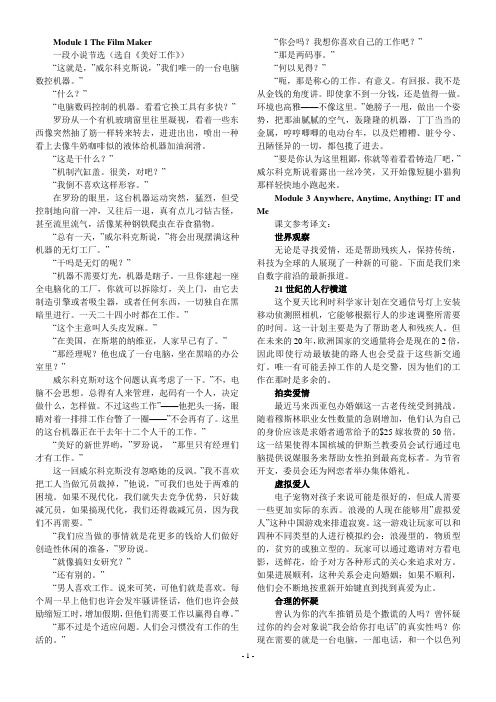
Module 1 The Film Maker一段小说节选(选自《美好工作》)“这就是,”威尔科克斯说,”我们唯一的一台电脑数控机器。
”“什么?”“电脑数码控制的机器。
看看它换工具有多快?”罗玢从一个有机玻璃窗里往里凝视,看着一些东西像突然抽了筋一样转来转去,进进出出,喷出一种看上去像牛奶咖啡似的液体给机器加油润滑。
“这是干什么?”“机制汽缸盖。
很美,对吧?”“我倒不喜欢这样形容。
”在罗玢的眼里,这台机器运动突然,猛烈,但受控制地向前一冲,又往后一退,真有点儿刁钻古怪,甚至流里流气,活像某种钢铁爬虫在吞食猎物。
“总有一天,”威尔科克斯说,”将会出现摆满这种机器的无灯工厂。
”“干吗是无灯的呢?”“机器不需要灯光,机器是瞎子。
一旦你建起一座全电脑化的工厂,你就可以拆除灯,关上门,由它去制造引擎或者吸尘器,或者任何东西,一切独自在黑暗里进行。
一天二十四小时都在工作。
”“这个主意叫人头皮发麻。
”“在美国,在斯堪的纳维亚,人家早已有了。
”“那经理呢?他也成了一台电脑,坐在黑暗的办公室里?”威尔科克斯对这个问题认真考虑了一下。
”不,电脑不会思想。
总得有人来管理,起码有一个人,决定做什么,怎样做。
不过这些工作”——他把头一扬,眼睛对着一排排工作台瞥了一圈——”不会再有了。
这里的这台机器正在干去年十二个人干的工作。
”“美好的新世界哟,”罗玢说,“那里只有经理们才有工作。
”这一回威尔科克斯没有忽略她的反讽。
”我不喜欢把工人当做冗员裁掉,”他说,”可我们也处于两难的困境。
如果不现代化,我们就失去竞争优势,只好裁减冗员,如果搞现代化,我们还得裁减冗员,因为我们不再需要。
”“我们应当做的事情就是花更多的钱给人们做好创造性休闲的准备,”罗玢说。
“就像搞妇女研究?”“还有别的。
”“男人喜欢工作。
说来可笑,可他们就是喜欢。
每个周一早上他们也许会发牢骚讲怪话,他们也许会鼓励缩短工时,增加假期,但他们需要工作以赢得自尊。
”“那不过是个适应问题。
- 1、下载文档前请自行甄别文档内容的完整性,平台不提供额外的编辑、内容补充、找答案等附加服务。
- 2、"仅部分预览"的文档,不可在线预览部分如存在完整性等问题,可反馈申请退款(可完整预览的文档不适用该条件!)。
- 3、如文档侵犯您的权益,请联系客服反馈,我们会尽快为您处理(人工客服工作时间:9:00-18:30)。
Lesson2The Game of the NameBy Peter FarbHere comes John Smith walking toward me. Even though he is but a passing acquaintance, the American greeting ritual demands that I utter a few words to reassure him of my good will. But what form of address should I use? John? Smith? Dr. Smith? A decision such as this is usually made unconsciously.As native speakers in the American speech community, we have grown up learning the rules of address at the same time that we were acquiring the grammatical rules of American-English. At first thought, it might seem a trivial pursuit to examine the ways in which we address one another. But forms of address reveal many assumptions we make about members of our speech community.Our initial decision about the appropriate address form is based on relative ages. If the person being addressed is a child, then almost all the rules that we have unconsciously assimilated can safely be ignored, and we use the simple formula First Name. The child, in turn, addresses an adult by using the formula Title plus Last Name (TLN).But defining a “child” is not always easy. I address my son's roommate at college by Uneven though he is an adult under the law. I, too, have the relative age of a child to a 75-year-old acquaintance who calls me Pete.Let us assume that John Smith is not a child who can be addressed by FN but is either my contemporary or my elder. The next important determiner for the form of address will then be the speech situation.If the situation is a formal one, then I must disregard all other rules and use social Identity plus Last Name. John Smith will always be addressed as Dr. Smith (or sometimes simply as Doctor, with Last Name understood) in the medical setting of office or hospital.(I am allowed to call him if my status is at least as high as his or if we are friends outside of our social roles, but the rest of my utterance must remain respectful.)We are also obliged to address certain other people by their social Identity in formal situation: public officials (Congressman: Your Honor),educators (Professor or Doctor),leaders of meetings (Mr. Chairman),Roman Catholic priests (Father Daffy) and nuns (Sister Anna),and so forth. By the way, note the sexist distinction in the formulas for priests and nuns. The formula for a priest is Father plus Last Name, but for a nun it is Sister plus Religious Name (usually an FN).Most conversations, however, are not carried on in formal speech situations, and so the basic decision is when to use FN to TLN.A social acquaintance or newly hired colleague of approximately the same age and rank is usually introduced on an FN basis. “Pete, I’d like you to meet Harry.” Now a problem arises if both age and rank of cone of the parties are higher:“Pete, I’d like you to meet Attorney Brown.”Attorney Brown may, of course, at any time signal me that he is willing to suspend the rules of address and allow an FN basis. Such a suspension is his privilege to bestow, and it is usually handled humorously, with a remark like,“I answer quicker to Bruce.” Complications arise when relative age and relative rank are not both the same. A young doctor who joins a hospital finds it difficult to address a much older doctor. They are equal in rank (and therefore FN should be used) but the great disparity in ages calls for TLN. In such cases, the young doctor can use the No-Name (NN) formula, phrasing his utterances adroitly to avoid using any term of address at all.English is quite exceptional among the world's languages in this respect. Most European languages oblige the speaker to choose between the familiar and formal second person singular (as in the French tu and vous), as English once did when“thou”was in use. This is the basic American system, but the rules vary according to speech situations, subtle friendship or kin relationships between the speakers, regions of the country, and so forth.Southern speech, for example, adds the formula Title plus First Name (Mr. Charlie) to indicate familiar respect. Southerners are also likely to specify kin terms (as in Cousin Jane) whereas in most of the United States FN is used for cousins. Address to strangers also alters some of the rules. A speaker usually addresses a stranger whose attire and behavior indicate higher status by saying sir. But sometimes speakers with low status address those with obviously higher status by spurning this rule and instead using Mac or buddy—as when a construction worker asks a passing executive, socially identified by his attaché case, “You got a match, buddy?”第二课名字游戏约翰·史密斯正朝我走过来。
